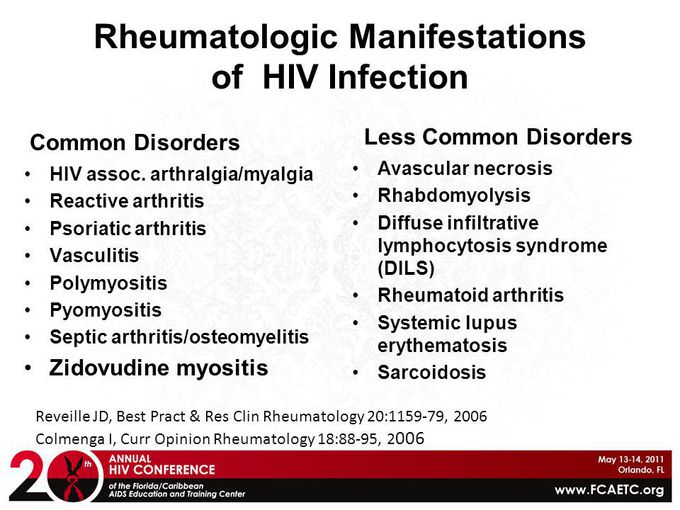


Rheumatologic Manifestations of HIV Infection
Infection with HIV has been associated with various rheumatic disorders, most commonly arthralgias and arthritis. HIV painful articular syndrome causes severe arthralgias in an oligoarticular, asymmetric pattern that resolves within 24 hours; the joint examination is normal. HIV-associated arthritis is an asymmetric oligoarticular process with objective findings of arthritis and a self-limited course that ranges from weeks to months. Psoriatic arthritis and reactive arthritis occur in HIV-infected individuals and can be severe; it remains uncertain whether the incidence of these disorders is increased in HIV-infected populations. These spondyloarthropathies can respond to NSAIDs, though many cases are unresponsive. In the era of highly active antiretroviral therapies, immunosuppressive medications can be used if necessary in HIV patients, though with caution. Muscle weakness associated with an elevated creatine kinase can be due to nucleoside reverse transcriptase inhibitor-associated myopathy or HIV-associated myopathy; the clinical presentations of each resemble idiopathic polymyositis but the muscle biopsies show minimal inflammation. Less commonly, an inflammatory myositis indistinguishable from idiopathic polymyositis occurs.
Living with HIV was one of the hardest experiences of my life. The fatigue, the emotional toll, and the uncertainty about the future weighed on me every single day. I had tried many treatments and medications, but nothing seemed to restore my health or energy the way I hoped.Out of both hope and desperation, I came across NaturePath Herbal Clinic. At first, I was skeptical but something about their natural approach and the powerful stories I read gave me the courage to try one more time.I began their herbal treatment program, and within a few weeks, I noticed small but meaningful changes more energy, better sleep, and a stronger immune system. Over the months, those improvements only grew. Today, I can truly say my life has changed. I feel healthier, more balanced, and finally in control of my well-being again.This isn’t just a testimony it’s a heartfelt recommendation to anyone living with HIV or any chronic condition. Don’t give up hope. I’m so grateful I gave NaturePath Herbal Clinic a chance. Visit their website to learn more: www.naturepathherbalclinic.com Email: info@naturepathherbalclinic.com


